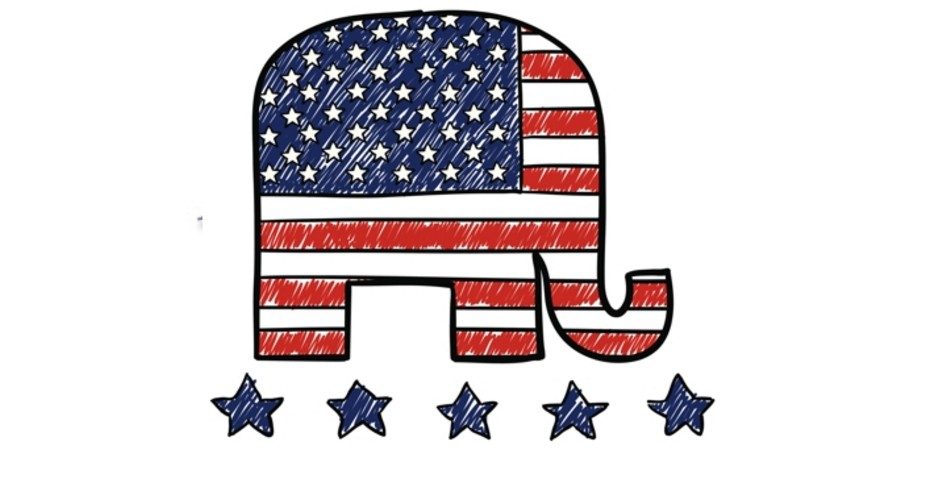
Less than a week before March 15, the date when GOP primaries will be held in five states, an analysis by the Washington Times puts Donald Trump within shouting distance of the GOP nomination for president at its national convention in Cleveland in July.
By next Tuesday evening 367 delegates from those states will have been awarded to their winners, with Donald Trump projected to take most of them, as four states are “winner-take-all” states, meaning that their delegates are bound to the winner on the first ballot in July. At the moment, according to Real Clear Politics, Trump holds the lead in all of them.
As the Times noted:
Donald Trump is on track to hand the Republican establishment an unprecedented defeat at their national convention in July, despite being outspent 3-1 by party leaders and their associates in their all-out effort to turn primary and caucus voters against him.
According to the Times’ projections, Trump will wind up just 74 delegates short of the 1,237 needed to win the first ballot — close enough to win, as explained by James Bopp, former RNC vice-chairman and rated one of the 100 most influential lawyers in America:
I cannot imagine [Trump] not getting a majority on the first ballot if he’s only 74 delegates short of a majority. Even if he were 174 short, if he had a substantial lead in delegates, it would likely be politically unacceptable for the anti-Trump forces to deny him the nomination.
The only state where Trump is being seriously challenged is Ohio, where he holds just a 2.5 percentage point lead over John Kasich, the state’s governor. It’s going to be close in Ohio, says Jim Ellis, a political activist and delegate allocation analyst: “To win a first-ballot victory on the basis of delegates bound to him on the basis of all primaries and caucuses, Trump will need to sweep the two March 15 winner-take-all states of Florida and Ohio.”
Reuters picked Trump to win two weeks ago based upon its own analysis, giving him a 95-percent chance of winning the GOP nomination. Said the editors, “We have always been bullish on a Trump nomination. Indeed, in September we gave Trump a 45 percent chance of being nominated.” Reuters’ editors counted the reasons why: 1) Trump led in nearly every poll taken up to that point; 2) Trump lost no ground when Jeb Bush ended his campaign; 3) Trump has proven to be “the Teflon candidate — few would have survived a fight with the pope and a series of overt policy reversals. Trump has not only survived but flourished.”
Just a week later the highly respected pollster Nate Silver wrote (albeit somewhat reluctantly) in his FiveThirtyEight blog, “If Trump continues to meet or exceed [our] targets through the remainder of the primaries, he’ll end up with just enough delegates to secure the Republican nomination.”
Silver added that although Trump hasn’t won a majority of the delegates awarded so far, he’s won enough of them to put him 5 percentage points ahead of where he needs to be to win in July. Wrote Silver: “If Trump hits his targets in the remaining contests, he’ll end up with 1,276 delegates out of 2,472 — 52 percent.”
But Trump could stumble in Ohio, said Silver, especially in light of Kasich’s position as its favorite son, as well as the barrage of attack ads from anti-Trump forces. And with Marco Rubio’s determination to stick with his faltering campaign, he could draw enough delegates away from Trump to push the convention beyond a first ballot. In that event the establishment might be tempted to change the rules at the very last minute, just as they did in 2012 to keep Ron Paul from speaking to the convention. But that comes with grave risks, as well. Any rule change would have to be approved by three-quarters of the delegates. If rules are somehow changed anyway, there could be a revolution in Cleveland that would severely damage the Republican Party for years. And delegates are unbound after the first ballot, with enough of them supporting Trump to make any change in the rules moot.
For now, however, based upon the best minds in the business, close is likely to be close enough for Trump to win on the first ballot.
A graduate of an Ivy League school and a former investment advisor, Bob is a regular contributor to The New American magazine and blogs frequently at LightFromTheRight.com, primarily on economics and politics. He can be reached at [email protected].



